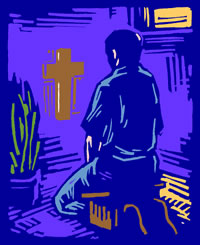
34th Sunday Year B - Christ the King
Today’s feast is a relative newcomer to the Church’s liturgy – established by Pius XI, last century, as the Church’s response to the emergence of totalitarian regimes. There is a certain irony in the fact that when it was established earthly kings and queens had become little more than figureheads. The gospels of the liturgies of this feast in the three year cycle, however, make it clear that this symbolic theme can still invite us to deepen our appreciation of the role of the Saviour in the designs of God. The first and second readings – from the prophecy of Daniel, concerning ‘the Son of Man’, and a reading from the Apocalypse proclaiming the fulfilment of the prophecy in Christ – remind us of the deep roots this theme has in the Scriptures. This year’s gospel reading from John takes us to the heart of the drama being enacted before the Roman governor – as, according to the words of Jesus at the Supper, the ‘Son of Man’ is being ‘glorified’, and in him God is being glorified. Jesus will reign, but he assures Pilate that his kingdom – ‘not of this world’ – is not in competition with the earthly powers Pilate represents. He will establish God’s reign, not by power and violence, but by bringing his ‘truth’ to the world, the truth that is one of the principal themes of John’s gospel (‘Father, consecrate my disciples in the truth, your word is truth’, Jn 14:6; ‘I AM truth and life’, Jn 14:6). This truth is a sharing in the wisdom of the Father, the personal truth in which we come to know who we are in the plan of God, the truth that ‘sets us free’ (Jn 8:32). The Kingdom announced and inaugurated by Jesus is a renewed creation, ruled by the ways of God - shaping all things, liberating them and leading them to their fullness. When Jesus teaches that this reign of God has already begun in a hidden way (Mk 4: 26 etc.) he is telling us that we can know something of this final achievement of God, when the truth he has brought to the world shapes our lives.
The exchange between Jesus and Pilate also makes it clear that the execution of Jesus is a consequence of his rejection by the establishment of the Jewish nation. In John’s gospel, this conflict is described in terms of the ‘truth’ that he has brought from his Father: ‘It is because I speak the truth that you cannot believe me’ (8:45). He has urged his people to find again their true calling in the designs of God, to be ‘a light to the nations’, showing the world the life and joy of a people living according to the ways they have learned from his Father.
John’s gospel, as we have seen, portrays Jesus as reigning on the Cross. His exchange with Pilate echoes through the continuing narrative, ‘Here is your king’, Pilate declares (18:14); the governor’s ‘notice’ reads ‘King of the Jews’ (18:19); Jesus entrusts the beloved disciple – standing for us all – to his mother (19:26); ‘the blood and water’ from his side are solemnly proclaimed as a blessing upon us all. What Jesus foretold early in his ministry has been realized: ‘The Son of Man must be lifted up so that everyone who believes in him may have eternal life’ (Jn 3:14). The symbol of kingship may have become archaic, but what it speaks of in the Scriptures, concerning the role of the Saviour in reign of God, has an everlasting relevance, far removed from the politics of this world.
John Thornhill sm

